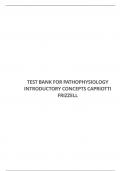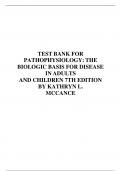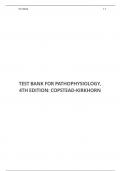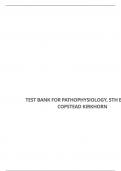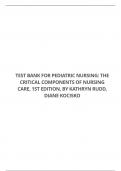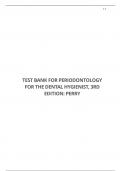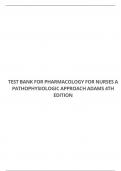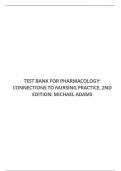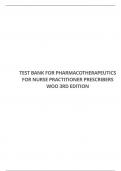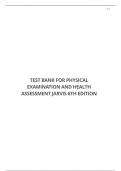Duke University School Of Medicine
Latest uploads at Duke University School Of Medicine. Looking for notes at Duke University School Of Medicine? We have lots of notes, study guides and study notes available for your school.
-
496
- 0
-
6
All courses for Duke University School Of Medicine
- Assessment of Visual and Auditory Systems Lewis: Medical-Surgical Nursing, 10th Edition 1
- ATI Maternal Newborn & Peds 1
- ATI Maternal Newborn Practice B 1
- ATI Maternal Newborn Proctored Exam 2020 / 2021 1
- ATI Maternal Newborn- Practice 2019 B 1
- ATI Med-Surg part A 1
- ATI PHARMACOLOGY ASSESSMENT 2019 1
- ATI PN MENTAL HEALTH PROCTORED EXAM 1
- ATI Skills module 2.0 Medication Administration 1 Notes 1
- Medical-surgical nursing ,10th Edition : assessment and management of clinical problems 5
- Medical-surgical nursing, 10th Edition : assessment and management of clinical problems 3
- MKT 331 Chapters 1 and 2 Test with answers - Cornell University 1
- MN 566 Week 5 Quiz {2020} - Cornell University 1
- MN 566 Week 7 Quiz {2020} - Cornell University 1
- MN 576 Unit 5 Midterm Exam: Cornell University 1
- MN566 Midterm Quiz {2020} – Cornell University 1
Latest notes & summaries Duke University School Of Medicine
Chapter 1: The Cell in Health and Illness Multiple Choice Identify the choice that best completes the statement or answers the question. ____ 1. Which statement regarding the sodium-potassium pump is correct? 1. The cell’s plasma membrane is more soluble to sodium ions than potassium ions. 2. The concentration of sodium ions should be higher inside the cell compartment. 3. The concentration of potassium ions should be higher outside the cell compartment. 4. The active transport involves...
TABLE OF CONTENTS PART ONE: CENTRAL CONCEPTS OF PATHOPHYSIOLOGY: CELLS AND TISSUES Unit I: The Cell 1. Cellular Biology 2. Altered Cellular and Tissue Biology 3. The Cellular Environment: Fluids and Electrolytes, Acids and Bases Unit II: Genes and Gene-Environment Interaction 4. Genes and Genetic Diseases 5. Genes, Environment-Lifestyle, and Common Diseases 6. Epigenetics and Disease Unit III: Mechanisms of Self-Defense 7. Innate Immunity: Inflammation 8. Adaptive Immunity 9. Alter...
Copstead-Kirkhorn: Pathophysiology, 4th Edition Chapter 1: Introduction to Pathophysiology Test Bank TRUE/FALSE 1. Normal ranges for physiologic parameters are arbitrarily defined based on population sampling. ANS: T 2. Values outside the normal range for a particular variable are always indicative of disease. ANS: F 3. Illness and disease always coexist. ANS: F 4. Normalcy is culturally defined. ANS: T 5. A change in a physiologic variable is more significant than the absolute val...
2 Chapter 1: Introduction to Pathophysiology Test Bank MULTIPLE CHOICE 1. C.Q. was recently exposed to group A hemolytic Streptococcus and subsequently developed a pharyngeal infection. His clinic examination reveals an oral temperature of 102.3° F, skin rash, dysphagia, and reddened throat mucosa with multiple pustules. He complains of sore throat, malaise, and joint stiffness. A throat culture is positive for Streptococcus, and antibiotics have been prescribed. The etiology of C.Q.’s...
Chapter 1: Issues and Trends Multiple Choice 1. A 3-year-old is an inpatient on an orthopedic floor. The mother is participating in care as much as possible. The nurse knows that the participation of parents with the care of a child is known as: 1. Family-Centered Care Model. 2. Medical Care Model of Care. 3. Patient-Centered Care Model. 4. Illness Care Model. ANS: 1 Feedback 1. Family-Centered Care emphasizes the planning, delivery, and evaluation of health care that is grounded in ...
1-2 Perry: Periodontology for the Dental Hygienist, 3rd Edition Test Bank Chapter 1: Historical Perspectives on Dental Hygiene and Periodontology MULTIPLE CHOICE 1. Periodontal diseases are as old as human civilization. Periodontal diseases in the early 1800s were considered incurable and beyond the reach of medical skill. a. Both statements are TRUE. b. Both statements are FALSE. c. The first statement is TRUE, and the second statement is FALSE. d. The first statement is FALSE, and th...
Adams, Pharmacology for Nurse: A Pathophysiologic Approach, 4/E Chapter 1 Question 1 Type: MCMA The nurse is teaching a pharmacology class to student nurses. What does the nurse include as key events in the history of pharmacology? Note: Credit will be given only if all correct choices and no incorrect choices are selected. Standard Text: Select all that apply. 1. Initial drugs included morphine, cocaine, and penicillin. 2. Early researchers used themselves as test subjects. 3. The ini...
Adams and Urban, Pharmacology: Connections to Nursing Practice, 2e Test Bank Adams and Urban, Pharmacology: Connections to Nursing Practice, 2e Test Bank Chapter 1 Question 1 Type: MCMA The nurse is teaching a pharmacology class to a group of student nurses. Which key event(s) does the nurse include in the history of pharmacology? Note: Credit will be given only if all correct choices and no incorrect choices are selected. Standard Text: Select all that apply. 1. Early researchers used...
Chapter 2: Review of Basic Principles of Pharmacology Multiple Choice Identify the choice that best completes the statement or answers the question. ____ 1. A patient’s nutritional intake and lab work reflects hypoalbuminemia. This is critical to prescribing because: A. Distribution of drugs to target tissue may be affected B. The solubility of the drug will not match the site of absorption C. There will be less free drug available to generate an effect D. Drugs bound to albumin are re...
1-2 Jarvis: Physical Examination & Health Assessment, 6th Edition Chapter 01: Evidence-Based Assessment Test Bank MULTIPLE CHOICE 1. After completing an initial assessment on a patient, the nurse has charted that his respirations are eupneic and his pulse is 58. This type of data would be: A) objective. B) reflective. C) subjective. D) introspective. ANS: A Objective data are what the health professional observes by inspecting, percussing, palpating, and auscultating during the phys...

